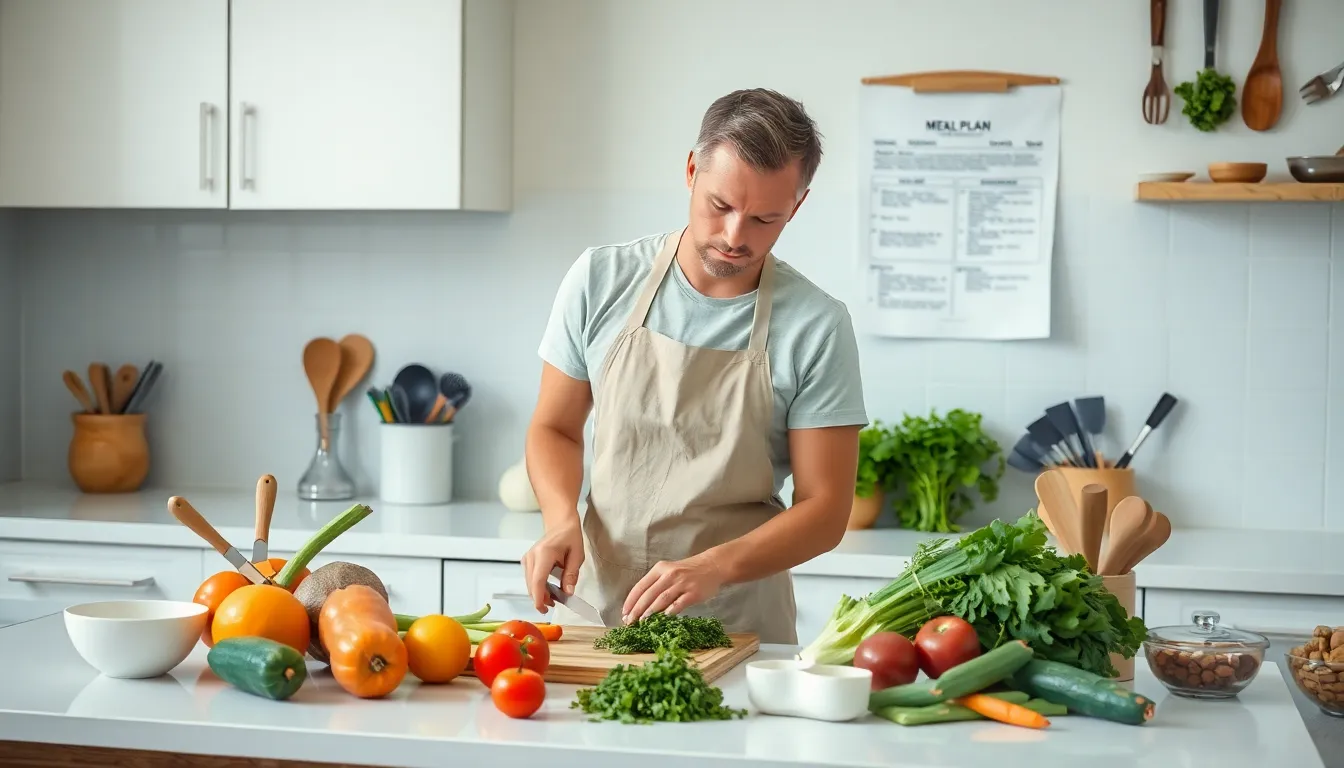In the bustling world of culinary creations, time can feel like a slippery fish—just when you think you’ve got a grip, it wriggles away. Whether it’s a weeknight dinner or a weekend feast, mastering time management in the kitchen is the secret ingredient to culinary success. Imagine whipping up a gourmet meal without the usual chaos, all while keeping your sanity intact.
Table of Contents
ToggleImportance Of Time Management In Kitchen
Time management plays a crucial role in the kitchen for numerous reasons. Effective time management helps streamline meal preparation, allowing cooks to focus on creating quality dishes. A well-organized kitchen utilizes time wisely, leading to less stress and chaos during cooking.
Utilizing time-efficient techniques reduces the likelihood of preparing meals under pressure. Chefs who plan their tasks can allocate specific times for chopping, cooking, and plating. This approach enhances productivity by minimizing downtime between tasks.
Prioritizing tasks leads to more successful cooking experiences. For instance, marinating meats or soaking beans can occur while preparing other ingredients. Utilizing waiting times efficiently keeps workflow smooth and uninterrupted.
Implementing a meal prep strategy can significantly enhance time management. Preparing ingredients in advance allows for quicker assembly during cooking. The practice of batch cooking encourages making larger quantities of food that can be stored for future meals.
Managing time effectively also improves overall kitchen cleanliness. Cleaning as one cooks reduces the need for extensive cleanup after a meal. An orderly workspace fosters focus and helps avoid mishaps.
Lastly, time management allows for creativity in the kitchen. When the pressure of time is alleviated, cooks can experiment with new recipes and techniques. Flexibility in meal planning opens up opportunities to explore diverse cuisines, enhancing culinary skills while keeping the process enjoyable.
Common Time-Wasting Habits

Time-wasting habits can severely disrupt efficiency in the kitchen. Recognizing these habits allows cooks to enhance their time management strategies.
Poor Planning
Planning poorly leads to chaos in meal preparation. Many cooks overlook the importance of a detailed menu for the week. Without a clear plan, ingredients often go unused, creating waste. Misjudgment of time required for each recipe compounds these issues. Establishing a timeline helps align tasks with cooking goals. Cooks should consider organizing meals around overlapping ingredients, which can simplify shopping and preparation. Prioritizing recipes based on cooking times minimizes delays and ensures a smooth workflow.
Lack Of Preparation
Preparation plays a vital role in efficient kitchen management. Some cooks underestimate the value of chopping vegetables and measuring ingredients ahead of time. This step minimizes scrambling during the cooking process, promoting a more organized space. Keeping gadgets and utensils within reach saves precious minutes as well. Preparing pans, pots, and tools before starting a recipe streamlines the cooking experience. Allocating time for preparation eliminates unnecessary interruptions, allowing cooks to focus on enjoying the culinary process.
Effective Time Management Strategies
Mastering time management in the kitchen requires practical strategies. Implementing effective meal prepping techniques can significantly enhance cooking efficiency.
Meal Prepping Techniques
Meal prepping involves organizing ingredients and meals ahead of time. Chopping vegetables, marinating proteins, or cooking grains in advance streamlines the cooking process. Preparing meals in batches allows cooks to save time during busy weekdays. Choosing recipes with overlapping ingredients minimizes waste and simplifies grocery shopping. Consider dedicating one day a week to meal prep, setting aside a few hours to prepare ingredients for the upcoming days. Doing so fosters a smoother cooking experience, enabling cooks to assemble dishes quickly.
Utilizing Kitchen Gadgets
Kitchen gadgets play a crucial role in improving time management. Food processors can chop, slice, and dice ingredients within seconds. Slow cookers allow for hands-free meal preparation, where cooks can set it and forget it until dinner. Instant pots serve multiple functions, reducing cooking times significantly. Integrating these tools into the cooking routine increases efficiency while minimizing manual effort. Hefty pots, pans, and baking trays can also aid in preparing larger batches, further maximizing output. Effectively utilizing customized kitchen gadgets transforms cooking from a lengthy chore into an enjoyable activity.
Organizing Your Kitchen Space
Organizing kitchen space enhances efficiency, making meal preparation smoother and less stressful.
Streamlining Your Workflow
Establishing a clear workflow in the kitchen dramatically improves efficiency. Prioritizing tasks simplifies the cooking process, allowing cooks to complete meals faster. Starting with mise en place, cooks can prepare all ingredients in advance, saving time during cooking. Systematically accessing items from the refrigerator, pantry, or countertop minimizes movement and distractions. Keeping frequently used tools within arm’s reach also accelerates workflow. Creating a timeline for meals helps in visualizing each step, ensuring tasks follow a logical order. Adjusting the layout to reflect the cooking process leads to an organized kitchen and reduces chaos.
Categorizing Ingredients and Tools
Grouping ingredients and tools by type makes finding what’s needed easier. Keeping spices together streamlines flavor selection for dishes. Separating utensils by function enhances preparation efficiency, as cooks swiftly grab what they need. Designating specific cabinets or shelves for baking supplies versus cooking tools simplifies selection. Organizing like items together forms a structured environment, reducing time spent searching for utensils. Using clear containers for pantry items allows easy identification and access. Labeling shelves or jars further assists in maintaining order and ensures everything is in its proper place.
Tips For Efficient Cooking
Mastering kitchen efficiency encompasses various methods and recipes that save time and enhance productivity. Implementing these strategies streamlines the cooking process.
Batch Cooking Methods
Batch cooking entails preparing larger quantities of meals in advance. Cooks can dedicate a day, preferably on weekends, to prepare several dishes that can be stored and reheated throughout the week. Organizing ingredients ahead of time maximizes efficiency and minimizes waste. Utilizing freezer-safe containers allows for easy storage and access to meals. This technique not only conserves time but also encourages balanced eating. Incorporating grains, proteins, and vegetables in bulk creates versatility for diverse meals throughout the week.
Time-Saving Recipes
Time-saving recipes often feature quick cooking methods and minimal ingredients. Selecting dishes that require less preparation, such as stir-fries or sheet pan meals, significantly reduces cooking time. One-pot meals, which combine proteins, grains, and vegetables, simplify cleanup. Utilizing slow cookers or instant pots can also yield tender meals with minimal effort. These strategies cater to busy schedules while offering nutritious options. Focusing on quick-fix recipes enables cooks to maintain their culinary creativity without sacrificing valuable time during the week.
Mastering time management in the kitchen not only enhances culinary success but also transforms cooking into a more enjoyable experience. By prioritizing tasks and implementing meal prep strategies, cooks can streamline their workflow and reduce stress. Organizing kitchen space and utilizing efficient tools further contribute to a smoother cooking process.
With these techniques in place, preparing gourmet meals becomes less daunting and more efficient. Embracing these time management practices allows for creativity in the kitchen while ensuring meals are both delicious and timely. Ultimately, a well-managed kitchen leads to greater satisfaction and less chaos, making every cooking endeavor a rewarding one.


